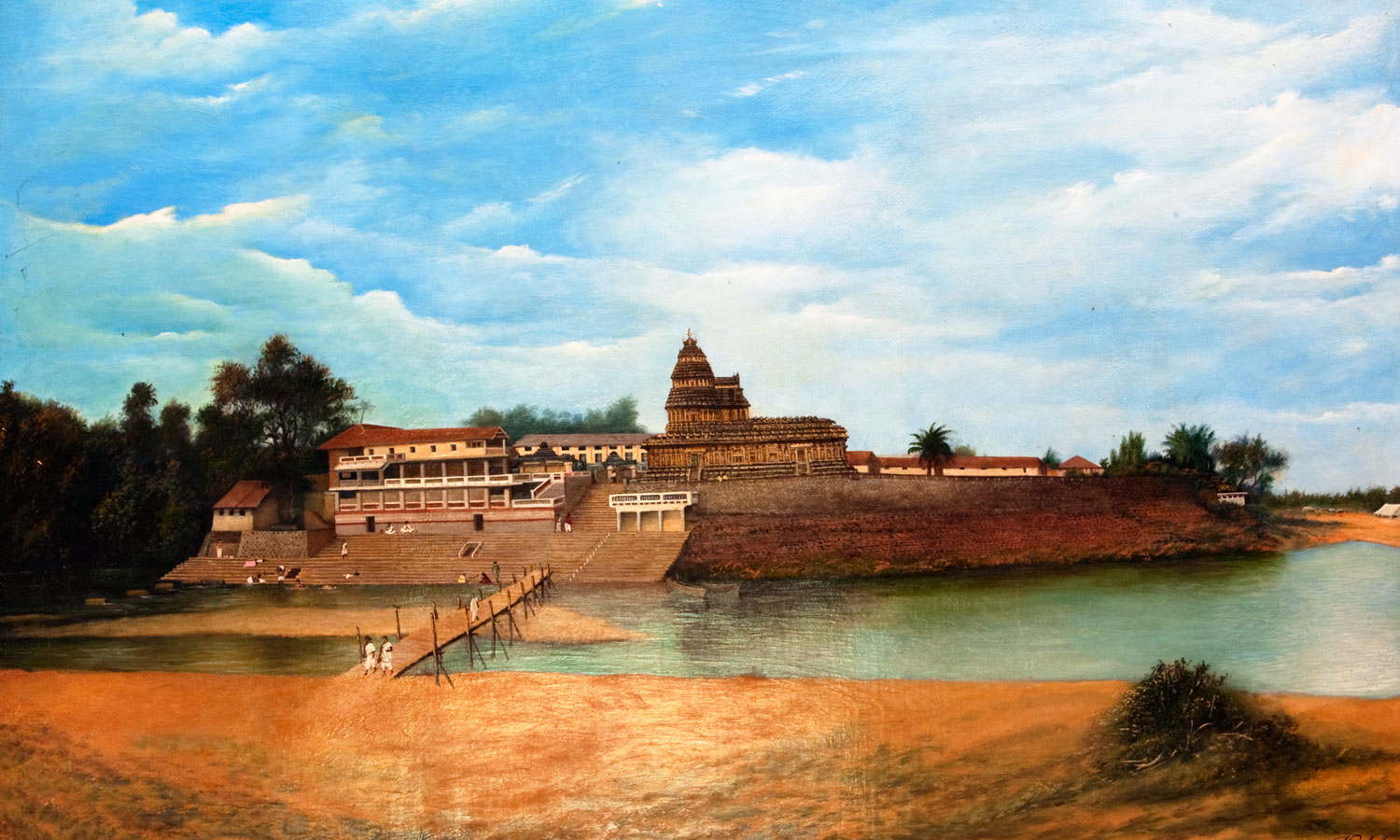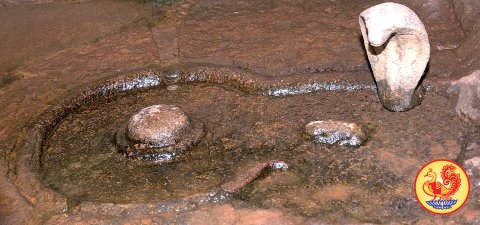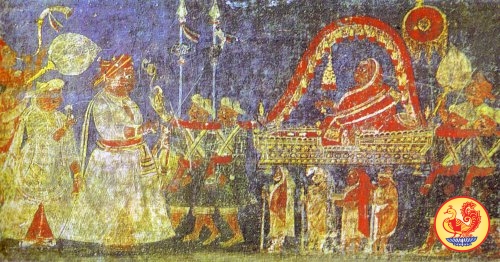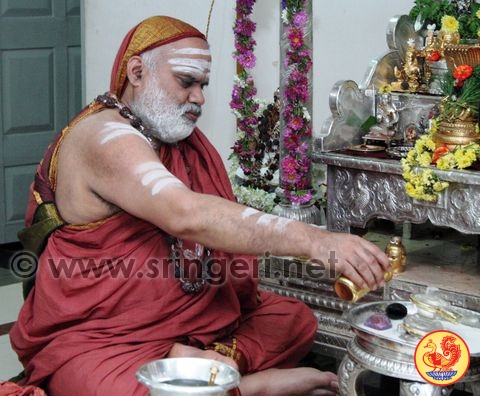Ancient Origins and Maharshi Rishyashringa
Sringeri bears a hallowed history that predates the Ramayana, sanctified by the tapas of great Maharshis through the centuries. Named after Maharshi Rishyashringa (as Rishyashringa-Giri, which later evolved into Shringa-giri and then Sringeri), this sacred place was where the renowned sage lived and performed intense tapas. Sage Rishyashringa holds profound significance in Hindu tradition, as He officiated the Putrakameshti for King Dasharatha, which ushered the birth of Bhagavan Sri Rama and his brothers. This direct connection to Sri Rama's birth establishes Sringeri's spiritual legacy well before the events of the Ramayana unfolded.
The Arrival of Sri Adi Shankaracharya
The sanctity of Sringeri attracted Jagadguru Sri Adi Shankaracharya with a remarkable insight. It was here that the Acharya established the first of the four Amnaya Peethams1 more than twelve centuries ago to foster the sacred tradition of Sanatana Dharma2.
Tradition recounts that after dispersing the non-Vedic creeds prevailing in the country, the Acharya sought a convenient yet holy place to establish an institution for spreading the truths of Advaita Vedanta. Upon reaching Sringeri, He witnessed an extraordinary sight on the banks of the sacred Tunga river—a cobra spreading its hood to provide shade for a frog in labor pains, protecting it from the scorching midday sun. Struck by the sanctity of a place that could instill harmony between natural adversaries, the Acharya chose this very location to establish His first Math.

A contemporary painting of Sringeri Sharada Peetham
Establishment of the Sharada Peetham
The Madhaviya Shankara Digvijayam is a kavya (poetic composition) by Jagadguru Sri Vidyaranya Mahaswamiji, the 12th Acharya of the Peetham, which describes the life and accomplishments of Jagadguru Sri Adi Shankaracharya. This composition chronicles that the Acharya encountered many virtuous individuals at Sringeri and taught them the Upanishadic philosophy of Advaita. He then invoked the Divinity of Knowledge, Goddess Sharadamba, and consecrated a murti of the Goddess. Thus, the Peetham He founded at Sringeri in South India for fostering the Vedas and the sacred tradition of Sanatana Dharma came to be known as the Dakshinamnaya Sri Sharada Peetham.

Sri Kappe Shankara. A sacred shrine situated along the banks of the Tunga river, commemorating a profound moment witnessed by Sri Adi Shankaracharya: a serpent sheltering a laboring frog from the harsh sun, revealing the universal presence of compassion even among natural enemies.
The Unbroken Guru Parampara
Jagadguru Sri Adi Shankaracharya appointed His prime disciple, Sri Sureshwaracharya, as the first Acharya of the Peetham. Since then, the Peetham has been blessed with an unbroken Guru Parampara, a garland of spiritual masters and Jivanmuktas representing Jagadguru Sri Adi Shankaracharya Himself. The succeeding Acharyas, reverentially referred to as Jagadguru Shankaracharyas, have led lives of such austere penance that disciples see in them the radiance of Sri Adi Shankara Himself.
A Center of Traditional Learning
Beyond being a center of spiritual power, Sringeri has also gained renown as a great place of traditional learning due to the presence of Goddess Sharadamba and the erudition of the Peetham's Acharyas. The Acharyas, established in the state of Self-realization or Jivanmukti, have authored commentaries on the Vedas and further expounded upon the Bhashyas of Sri Adi Shankaracharya. They have also authored numerous independent works related to Advaita and composed many hymns expressing their ardent devotion to the non-dual Supreme worshipped in multifarious forms. The Peetham thus came to be regarded as the Vyakhyana Simhasana, The Throne of Transcendental Wisdom. Consequently, the Birudavali of the Sringeri Jagadgurus hails the Acharya as the one who adorns this throne. Many regard Goddess Sharadamba Herself as moving in the form of the presiding Acharya, Jagadguru Shankaracharya Sri Sri Bharathi Tirtha Mahaswamiji.

Sri Vidyaranya Mahaswami receiving royal honors. The revered sage is carried in the ceremonial Adda-Pallaki (royal palanquin) by Vijayanagara Emperors Harihara and Bukkaraya. This 17th-century painting recreates the original mural from Virupaksha temple at Hampi, depicting a tradition of reverence that continues to this day.
Founding of Vijayanagar Empire and Royal Patronage
In the 14th century, the 12th Acharya, Jagadguru Sri Vidyaranya, actively guided and inspired the founding of the well-known Vijayanagar empire, establishing a powerful bond that brought royal patronage to the Peetham. The austerity of the Acharya influenced the rulers to such an extent that they began ruling in the name of the Acharya and granted the Peetham rights over secular administration of the land. At the rulers' earnest request, the Acharya graciously instituted a Durbar during the Navaratri festival—an occasion established by the rulers to honor their revered Guru. Subsequently, the Acharya came to be known as the Karnataka Simhasana Prathisthapanacharya, and the Peetham became a mighty institution—a Samsthanam and is known to this day as the Jagadguru Shankaracharya Mahasamsthanam, Dakshinamnaya Sri Sharada Peetham, Sringeri. Over the succeeding centuries, numerous empires and rulers including the Mysore Maharajahs Hyder Ali and Tipu Sultan, the Nizam of Hyderabad, the Peshwas, the Keladi rulers, and Travancore Rajas were drawn towards the Peetham and respected the Acharya as their Guru.

Jagadguru Shankaracharya Sri Sri Bharati Tirtha Mahaswamiji worshipping Lord Chandramoulishwara
Recent Illustrious Acharyas
In the recent past, the Sharada Peetham has shone through the lives of the Acharyas—the 33rd Acharya, Jagadguru Sri Sacchidananda Shivabhinava Nrisimha Bharati Mahaswamiji, the re-discoverer of Sri Adi Shankaracharya's birthplace at Kalady and the founder of the famous Pathashala at Sringeri; the 34th Acharya, Jagadguru Sri Chandrasekhara Bharati Mahaswamiji, the renowned Jivanmukta; and the 35th Acharya, Jagadguru Sri Abhinava Vidyatirtha Mahaswamiji, the crest jewel of Yogis. All the Acharyas have left indelible impressions in the hearts of disciples.
The Living Legacy
Given the rich history associated with Sri Adi Shankaracharya's first and foremost Peetham, many marvel at the Acharya's choice of locating the Peetham at Sringeri, a place with a sacred legacy from time immemorial, adorned with natural splendor and serenity.
Today, the Sringeri Sharada Peetham, graced with an unbroken chain of Acharyas, continues to uphold the principles of Sanatana Dharma with the 36th Acharya Jagadguru Shankaracharya Sri Sri Bharati Tirtha Mahaswamiji, and His Uttaradhikari3, Jagadguru Shankaracharya Sri Sri Vidhushekhara Bharati Mahaswamiji serving as a treasury of spiritual wisdom and peace for all seekers.
Glossary
- Amnaya Peetham. Amnaya–The Veda; Peetham–Throne. Lit. throne of the Veda. Seat of learning established for the preservation and propogation of the Veda. Jagadguru Shankaracharya established four centres in the four corners of the country for the safeguard and propagation of the four Vedas and appointed each of his prime ascetic disciples as the heads of each centre respectively.
- Sanatana Dharma. Ancient / Universal Dharma. Lit. Universal law that is binding on all creation since time immemorial.
- Uttaradhikari. Successor-designate. The Uttaradhikari of a Jagadguru is chosen by a current Jagagduru through the divine inspiration of Goddess Sharadamba and that of His own Guru, to maintain the Avichchinna Guru Parampara. The Uttaradhikari, revered as another physical representation of the current Jagadguru, is the chosen successor to the Peetham.


